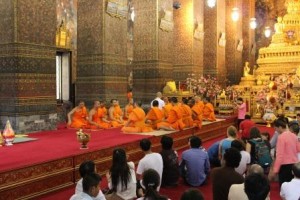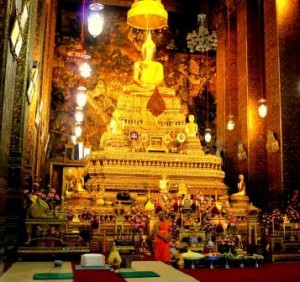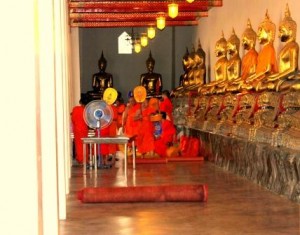Monks in Thailand
The belief amongst Thai Buddhists is that monks are the most likely people to reach enlightenment. Monks follow a very strict code of conduct, an existence with no material attachments whatsoever.
A Thai monk’s life is based around the 5 major precepts of Thai Buddhism and 227 monastic rules they must abide by, including no lies, no sex, no killing and no alcohol.
While there are a great many monks who spend their whole lives living out this existence, trying to reach Nirvana, there are also a great deal of monks who only spend a short time living in the Temple.
It’s a popular custom for young adolescent males in Thailand to spend a short time as a monk, in order to receive merit for their parents and themselves.
A boy is not considered to be a man until he has spent some time as a monk, whether it’s just for a few days, weeks or even years.
There are many families in Thailand that will, even today, refuse to allow their daughter to marry a man if he hasn’t spent time as a monk. Thais believe he is not ‘ripe’, not experienced enough to marry until he has done so.
Life as a monk can be a very harsh experience. They have very few possessions, only a bowl for eating and collecting food each morning, a water bottle and filter, and their long saffron colored robes.
They are only allowed to eat food in the morning until noon after which only water may be consumed.
Men can exit this life at any time of their choosing, yet there is still a strong tradition in Thailand that implies an important or high ranking official, if he has made major mistakes or errors, should retire into a temple for a time.
There, he can ‘wash’ his errors and make merit to repay the harm he has done to society.
One recent example of this is the case of Thanom Kittikachorn, the General who presided over one of Thailand’s most repressive military regimes between 1963 and 1973.
Following his ousting, he went into exile, only to return to the country again in 1976 wearing monk’s robes.
This was an act that provoked anger of many of the pro-democracy students who remembered the hundreds of casualties from the government crackdown in October 1973, just before the Kittikachorn regime was overthrown. The students wanted him put on trial to pay for what he had done, but instead he was given immunity so long as he remained a monk.
Foreigners are also welcome to join the ranks of the monks of Thailand, so if you are a man and feel the calling, go for it. It is sure to be an experience of a lifetime.





A Thai Buddhist friend mentioned that there are monks who treat the monkhood as Thailand’s welfare system. They lack the drive to do anything else for a living so they wear the robes but they don’t practice seriously. And unless they break the rules in a shocking way, they are allowed to stay on year after year.
I’ve also read a handful of reports/books from westerners who spent time in Thailand as monks and most discuss the issue.
A person I know has no life savings, no living family here that she knows. And like most Thais she does have extended family. But if at the end of her life she doesn’t have anyone to live with she’ll become a nun.
With no welfare net available, in a Thai way it all makes sense.
PS: there is no way to sign up for email alerts to comments so if you do comment back and I don’t reply, I’ve merely forgotten to come back and check.
Thanks for the insight Catherine. Like you said it would make sense for certain people to think that way. By becoming a monk they get a roof over their head and food. Although I would imagine that if they are not devoted to this kind of life it would be a challenge to live up to the standards expected of them.